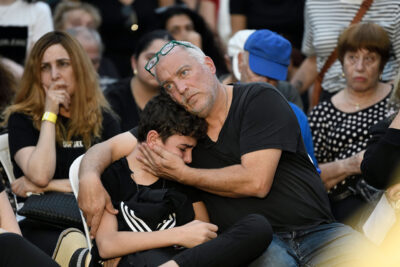This was originally published on jewishchallenge.org.
On October 7th, Israel bore witness to an unprecedented wave of attacks that sent shockwaves through its society, leaving an enduring mark on the nation’s collective consciousness. These attacks also created a profound impact on Israel education.
Over the past two months, Unpacked for Educators has been fielding non-stop requests from schools with variations of the same questions: How can we help our students meet the challenges of the current moment? What should we be teaching our students now about Israel? How can we give students the resources and support they need to process the barrage of antisemitic content they are seeing online?
In other words, help!
I want to share four suggestions for what schools can do to help their students address the challenges of the current situation.
- Elevate the importance of proactive Israel education: Since October 7th, many schools have been racing to address their students’ questions about Israel, reacting rather than proactively planning their Israel education. A proactive approach involves setting aside time in our curricula for serious Israel education, ensuring that our students know Israel’s most important moments and feel confident sharing Israel’s story.
It is essential for our students to understand that while political Zionism emerged in the late 1800s, the Jewish connection to the land of Israel spans thousands of years. They should discuss the debate over the Uganda plan and whether the concept of Zionism can exist without Zion. They should explore the diverse narratives surrounding 1948, what the story of the Altalena can teach us about Jewish unity during crises, and how examining different versions of the Hamas charter can help us understand our current enemy.
Let’s take the time to intentionally think about what we want our graduates to know, feel, and be able to do regarding Israel, and then, let’s get to work. - Social media is a skill: A recent Pew research study found that a third of U.S. adults under 30 regularly get their news on TikTok. In today’s digital world, where our teens can spend an average of eight hours a day online, they often face a constant stream of misinformation and antisemitism.
We need to teach our students the difference between anti-Zionism and antisemitism, when to respond to online trolls, and how to be responsible consumers of social media. These are learned skills, and we need to open up discussions with our teens about best practices for online use, now more than ever. - Focus on the positive: During this time of tragedy in Israel, it’s crucial for us to share moments of hope and resilience with our students. This is especially important for students who have not yet been to Israel, who need to know that it is more than a place of war and fear.
Let’s highlight the unprecedented unity now found in Israeli society, the volunteerism of Israeli teens, the increase in Haredi enlistment in the IDF, heroes like Rachel from Ofakim, and the babies named Oz and Be’eri after devastated communities. Let’s continue to teach about Israel’s rich diversity of music cuisine, and culture.
For students with social media platforms, let’s encourage them to share their favorite parts of Israel’s story instead of just responding to accusations online. With all of the darkness, let’s remember to spread the light. - The need for moral clarity: We need to guide our students in differentiating between when there is room for diverse narratives concerning Israel and when there is not. At Unpacked for Educators, we often say that while the Israeli-Palestinian conflict is complicated, what happened on October 7th is not.
There are many opinions across the political spectrum that one can debate about, concerning Israel’s treatment of Palestinians, whether to build or remove settlements, or even about hostage negotiations. However, that is separate from opinions that deny the October 7th massacre took place, frame it as justified resistance, or simplify the conflict into binary categories of oppressed and oppressor. Our students need to know the difference between facts and opinion in order to successfully navigate the current discourse about Israel online and in-person.
While Israel education in a post-October 7th world isn’t easy, it’s one of the most important things we can teach our children. But, you don’t have to do it alone. At Unpacked for Educators, we provide everything schools need in order to teach about Israel, including lesson plans, videos, discussion questions, and curricular outlines. Our collaborative program provides schools with curriculum development support and teacher coaching.
Please be in touch to discuss ways we can help you and your school meet the Israel education needs of the moment. We’re all in this together!



